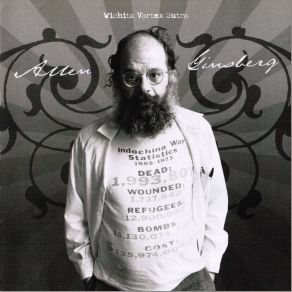Wichita Vortex Sutra
Download links and information about Wichita Vortex Sutra by Allen Ginsberg. This album was released in 2004 and it belongs to Alternative, Theatre/Soundtrack genres. It contains 12 tracks with total duration of 42:50 minutes.

|
|
|---|---|
| Artist: | Allen Ginsberg |
| Release date: | 2004 |
| Genre: | Alternative, Theatre/Soundtrack |
| Tracks: | 12 |
| Duration: | 42:50 |
| Buy it NOW at: | |
| Buy on iTunes $9.99 | |
Tracks
[Edit]| No. | Title | Length |
|---|---|---|
| 1. | Turn Right Next Corner (featuring Christian Marclay, Art Baron) | 2:52 |
| 2. | Thy Sins Are Forgiven, Wichita! (featuring Lee Ranaldo) | 2:25 |
| 3. | Approaching Salina (featuring Art Baron) | 2:16 |
| 4. | Thrills of Fear (featuring Michael Blair) | 2:06 |
| 5. | II Face the Nation (featuring Lee Ranaldo, Lenny Kaye, Elliott Sharp) | 3:45 |
| 6. | A Black Horse Bends Its Head to the Stubble (featuring Marc Ribot, David Mansfield) | 1:41 |
| 7. | Stop, And Eat More Flesh (featuring Elliott Sharp) | 3:20 |
| 8. | N B C S U P A P I N S L I F E (featuring Lenny Pickett, Steve Shelley) | 4:11 |
| 9. | Here's Marysville (featuring Lenny Kaye, David Mansfield) | 2:58 |
| 10. | I'm an Old Man Now, And a Lonesome Man in Kansas (featuring Philip Glass) | 7:16 |
| 11. | Cars Passing Their Messages Along Country Crossroads (featuring Hal Willner, Christian Marclay, Art Baron) | 2:59 |
| 12. | Future Speeding on Swift Wheels (featuring Lee Ranaldo, Hal Willner, Christian Marclay, Art Baron) | 7:01 |
Details
[Edit]Allen Ginsberg's Wichita Vortex Sutra, an epic poem about the Vietnam War, was written in 1966. It follows Howl and Kaddish as his third major work and once more links him in direct lineation to Walt Whitman as a chronicle of American conscious as it expands through each era. This particular performance of the work was recorded live at St. Mark's Poetry Project at St. Mark's Church in the Bowery on New York's Lower East Side. Accompanied by musical collaborators that include Philip Glass, Elliott Sharp, Lenny Kaye, Marc Ribot, Arto Lindsay, Steve Shelley, Hal Willner, Christian Marclay, and others, this particular recording has never been publicly issued. Of all of Ginsberg's recordings, this one works especially well, partly because the performance of this work is complete and the musicians understand their role in painting the poet's words, and partly because of Ginsberg's willingness to serve the language. This works in spades, it flows, it has drama and humor and pathos and poignancy, and it is drenched in a terrible kind of beauty. His descriptions of Kansas and the pastoral American mindset is one of compassion and visionary simplicity, and his indictment of the Pentagon and the war mentality that surrounded America's government during the Vietnam War is profoundly eerie in light of the situation America found itself embroiled in during the Iraq War. Timely, moving, and artfully rendered, Wichita Vortex Sutra is one of Ginsberg's finest moments as a poet, and certainly his finest and most compelling recording.